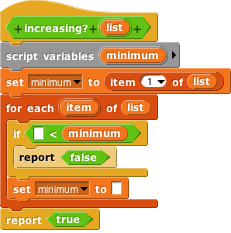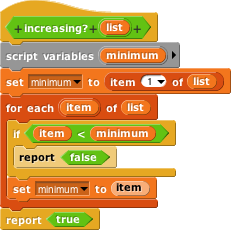Write a predicate increasing? that takes a list of numbers as input, and outputs true if the numbers are in increasing order (equal neighbors are okay), or false otherwise.


Consider the following problem:
Write a predicate increasing? that takes a list of numbers as input, and outputs true if the numbers are in increasing order (equal neighbors are okay), or false otherwise.


Because this is a predicate, it's tempting to try to make it use keep:

But map, keep, and combine work when each item in a list
can be considered independently of the others.
In this problem we have to
consider each item in relation to the ones that have come before it:
"Is this number at least as big as the ones we've already seen?"
To do this, we need to write a loop.
The loop needs to go through the lists items, from left to right, and keep track of the last item that
it saw.
But, as with map, we don't need to keep track of
the specific number of where we are in the list (e.g., the third position, the first position, etc.)
Those index numbers have nothing to do with the problem we're trying to solve.
The solution is to use the for each item block, this way:

Like the functions used as input to map and friends,
the script inside the C-shaped slot of for each item
interprets empty input slots (in the < and set blocks)
as placeholders into which an item of the list will be entered.
For each item promises to go through the list starting with item 1 and continuing in sequence to the end of the list. We use a script variable minimum to remember the most recent item's value, which is the
minimum allowable value for the next item. If any item is smaller than that
remembered value, increasing? reports false.
If we make it to the end of the list without violating that requirement,
then increasing? reports true.
Note that the for each item block has the word "item"
in a round orange block. It's a variable, and you can drag it into the script
that goes inside the C-slot, instead of using an empty input to
represent the list item:

You can work with the above script here.
Try this:
Display a longish list using time instead of space on the screen
by  ing each item for two seconds.
ing each item for two seconds.
Try this: Write an expand reporter that takes a sentence
as input, and reports a sentence that's the same except
that each number in the input is replaced by
that many copies of the following word:
